We’ve all heard the phrase, “if it sounds too good to be true, then it probably is.” I’ve been thinking lately about how much this phrase really applies to our modern day society. There seems to be an easy fix for just about every need we have today. Can’t sleep? No worries, just take a pill! Need an afternoon pick-me-up? Just chug down a shot of 5 Hour Energy! Do you want to be heart healthy? Sure, just grab a box of highly-processed cereal with a cute cartoon character and we’ll fix that heart right up with all those “heart healthy grains.” Trying to cut back on sugar? That’s easy, just choose a “sugar-free” artificial syrup to put in your coffee! Watching your calories? Why not go for the lowfat cookies or salad dressings? With these wonderful modern conveniences, all of our problems are solved right? Well, with obesity, heart disease, cancer, diabetes, and many other diseases on the rise – I think not.
Every day we are so bombarded with tons of information and clever advertising that it’s no wonder that most Americans just accept the status quo and get duped into thinking that there is an easy fix for just about every need. The food industry is first and foremost, a $money-making$ business. These big companies that comprise the majority of commercials we see on TV are not looking out for your health. And unfortunately, a lot of what we see on the front side of food packaging labels are really outright lies. It is the responsibility of the consumers to be diligent about reading the entire package. To really get a clear picture of what you are eating, pay attention to serving size, the ingredient list, and where the item is coming from, etc.
What about all of these trendy catchphrases such as “lowfat,” “sugar-free” and “gluten-free” that confuse people into thinking they are making healthy choices? Gluten-free in particular has really become a popular topic recently and most people have no idea what that means or if they should be consuming it or not. I recently had a discussion with friend who declared that she wants to start eating gluten-free. When I asked if she had a known intolerance to gluten, she looked at me and said, “oh, I don’t know?” I told her that if she wanted to find out she could get tested or better yet eliminate it for at least 30 days and to see how she feels as a result. Unless you have a gluten intolerance or celiac disease, there are no benefits to consuming gluten-free processed food products. According to Dr. William Davis, a cardiologist and author of the book, Wheat Belly, most of these products are made with starches (i.e. potato starch or tapioca starch) that will raise blood sugar levels just as high or in some cases even higher than products made with gluten. This of course, can lead to diabetes among other inflammatory causing diseases.
I implore consumers to not get swayed by catchy “sounds too good to be true” phrases such as “lowfat,” “sugar-free,” and “gluten-free.” While it sounds like a great idea at first glance – just think about what is being substituted instead. Companies still need their products to taste good and to still pass as a real looking cookie or piece of bread for example. So think about what kind of chemical additive or high-glycemic ingredient are they using to put back into the food? Products that claim to be free of High Fructose Corn Syrup most likely still contain another form of sugar (maltodextrin, dextrose, and sorbitol for example are among the list of 50 other names for sugar: http://www.dietriffic.com/2009/03/26/names-for-sugar/). Also, watch out for the free of trans fat labels because you might still catch hydrogenated or partially hydrogenated oils on the ingredient list.
So what’s the answer? I think it is to stick to foods in their purest, most whole form. Try to make your own protein/granola bars instead of buying ones with loads of scary looking ingredients. Get away from boxed foods as much as possible at the grocery store. At a restaurant, swap that trendy, more expensive gluten-free bun for a lettuce wrap instead. When in doubt, repeat the mantra “if it sounds too good to be true, then it probably is” and I hope this helps the decision-making process!
Here’s an example of homemade “larabars” that you can make at home with 4 to 5 simple ingredients! Original recipe here: http://

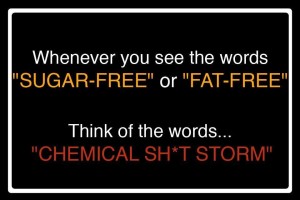
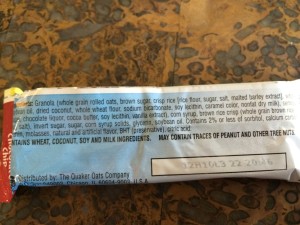
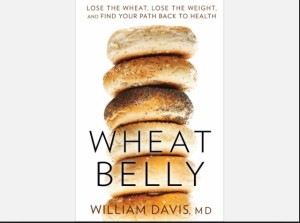
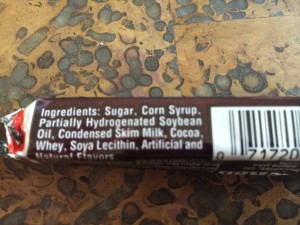
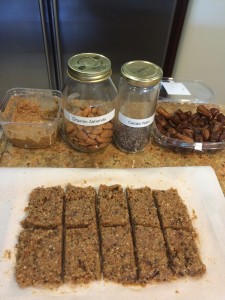
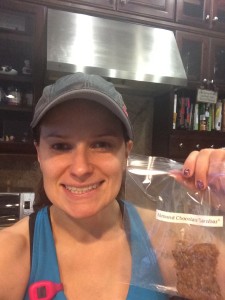
Hi Kristen
I read a lot of your articles and so much relates to my Cancer Presentations, called “Cancer it’s Just a Dirty Word”, in terms of Nutrition, and based on Lifestyle, Exercise and Anti -cancer Diet.
I was diagnosed with Stage #3 high Risk Cancer almost 3 yrs ago and had all my staff in my environmental company assist me , and go through tremendous reliable research to find other options to the present Orthodox treatment that have are not effective, address the Symptoms, and not the Cause and in many ways cause secondary cancer.
If you have time go on Facebook and find us on “Cancer it’s Just a Dirty Word”
Our web is fckcancer.ca and look into our Section on Cancer Causing Factors, Nutrition section etc. some of this may be usual for you to reference to.